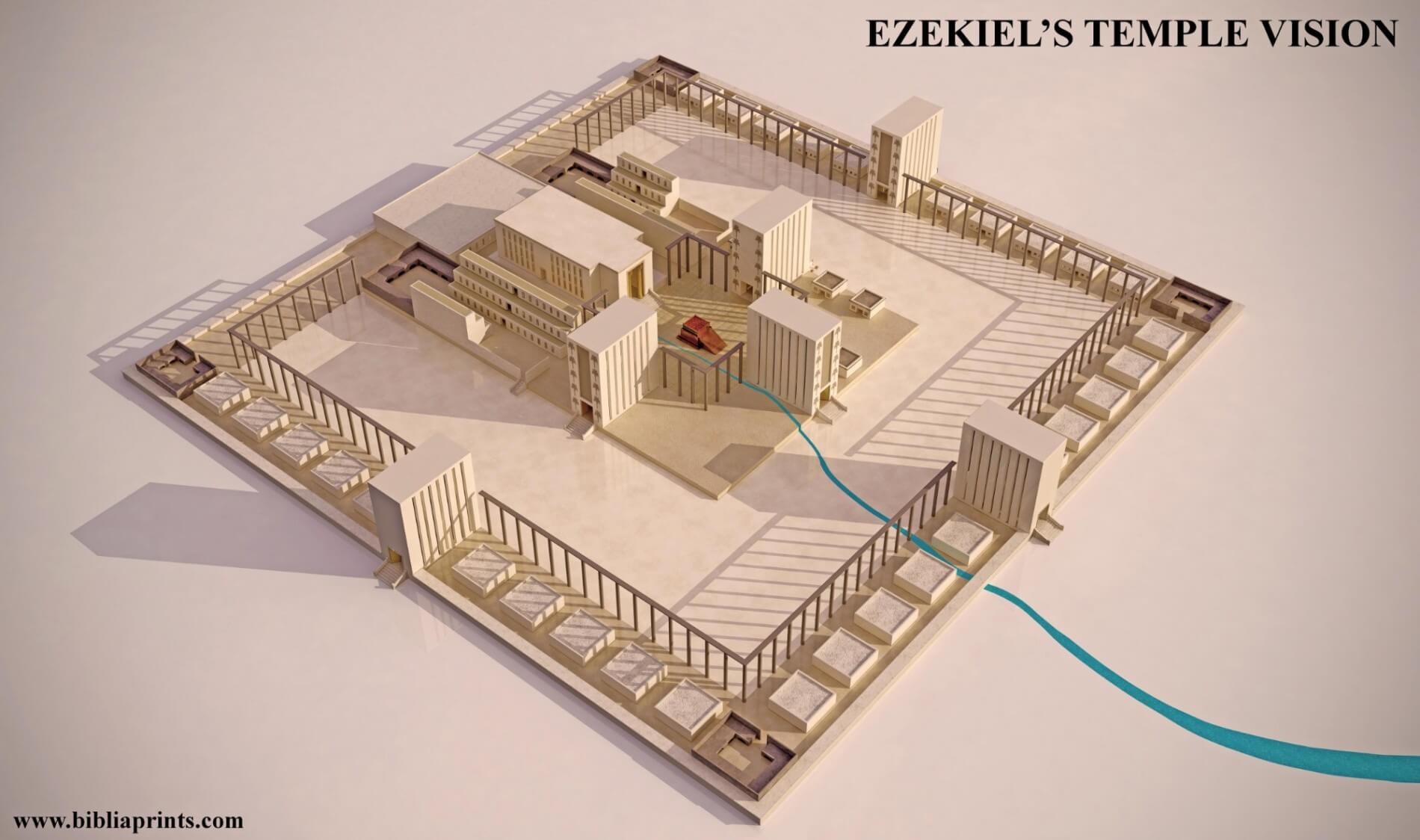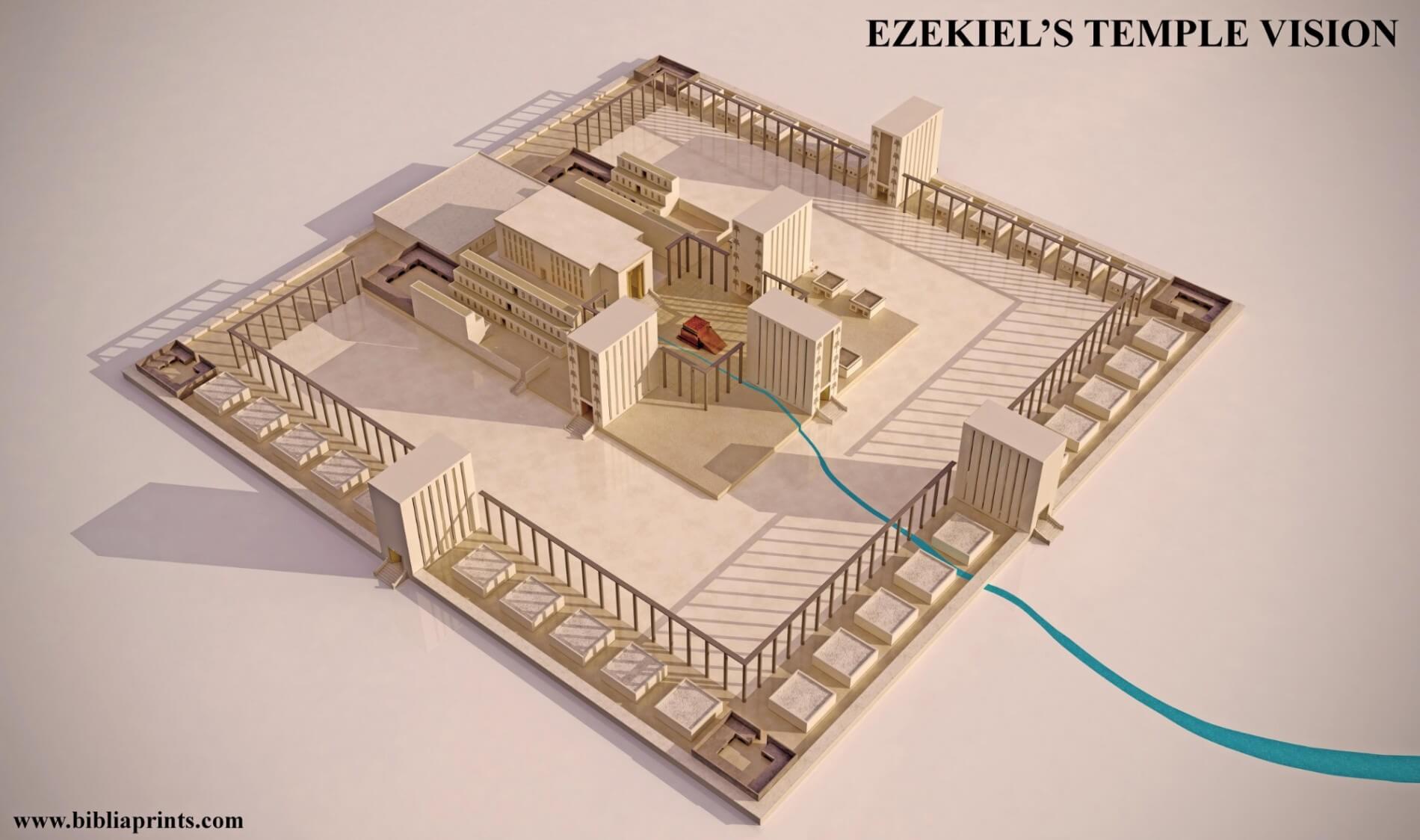- Jan 26, 2012
- 5,128
- 1,155
- Country
- United States
- Gender
- Male
- Faith
- Messianic
- Marital Status
- Private
First a few details about measurements. In my studies I have discovered that the hand-breadth is three and a half thumbs. The span is two hand-breadths which amount to seven thumbs. The common cubit, the cubit of a man, is five hand-breadths, which amount to seventeen and a half thumbs. The cubit of a cubit and a hand-breadth is therefore one common cubit of seventeen and a half thumbs plus a hand-breadth of three and a half thumbs, for a total of twenty-one thumbs, (17.5+3.5=21). Moreover the larger cubit of twenty-one thumbs amounts to six hand-breadths, (6*3.5=21), which is also three spans, (3*7=21).
The gates of the Ezekiel Temple are six, three outer gates and three inner gates, and they are all of the same measurement. These gates appear very narrow because of an extraordinary height of sixty cubits, (Ezekiel 40:14), that is, by the cubit of a cubit and a hand-breadth, (the cubit of twenty-one thumbs).
Here is a typical model-drawing of the Ezekiel Temple just to show what I mean about the tall narrow design of the gates, (with a link to where I found it below the image file, which is only to give credit, and really has nothing else to do with this thread).


 ge315.org
ge315.org
So then, what can we glean from this information in light of the following statement from the Master?
Matthew 7:12-14 TS2009 (W/Footnotes)
12 “Therefore, whatever you wish men to do to you, do also to them, for this is the Torah and the Prophets.
13 “Enter in through the narrow gate! Because the gate is wide – and the way is broad – that leads to destruction, and there are many who enter in through it.
14 “Because the gate is narrow and the way is hard presseda which leads to life, and there are few who find it. Footnote: aOr the way is afflicted.
The way is hard-pressed? afflicted? Yes:
G2346 θλίβω thlibo (thliy'-ɓō) v.
1. to compress.
2. to squeeze.
3. to press hard.
4. (passively) to be hard pressed.
5. to pinch.
6. (figuratively) to press in against, to crush (in a crowd).
{literally or figuratively}
[akin to the base of G5147]
KJV: afflict, narrow, throng, suffer tribulation, trouble
See also: G5147
Wait a minute, this is nearly identical to the word typically used for the so-called tribulation, (a noun), even the great tribulation mentioned in Rev 7:14, which is megas with thlipsis.
G2347 θλίψις thlipsis (thliy'-psis) n.
pressure.
{literally or figuratively}
[from G2346]
KJV: afflicted(-tion), anguish, burdened, persecution, tribulation, trouble
Root(s): G2346
And look at that, thlipsis actually comes from thlibo, the verb, our word used in the Matthew passage quoted above. So the gate is not only narrow but also troublesome, as in tribulation, (see also Acts 14:22, much tribulation, thlipsis).
Okay, so how tall is this narrow gate of the Ezekiel Temple again? Oh yeah, sixty cubits by the cubit and a hand-breadth, which is the cubit of twenty-one thumbs. And how many thumbs are in sixty cubits by the cubit and a hand-breadth?
21*60 = 1260
Hmmm, that number 1260 sure sounds familiar, I think I saw it in Revelation 11 after the command to measure the Temple. I suppose it is kind of like saying enter through the Tribulation 1260 gate. I also heard the same in Paul's Tribulation Gospel.
The gates of the Ezekiel Temple are six, three outer gates and three inner gates, and they are all of the same measurement. These gates appear very narrow because of an extraordinary height of sixty cubits, (Ezekiel 40:14), that is, by the cubit of a cubit and a hand-breadth, (the cubit of twenty-one thumbs).
Here is a typical model-drawing of the Ezekiel Temple just to show what I mean about the tall narrow design of the gates, (with a link to where I found it below the image file, which is only to give credit, and really has nothing else to do with this thread).


Ezekiel 40-43: Ezekiel's Vision of the Temple | GE315
Jehovah is holy and cares for the way how he is worshipped. God has lofty standards and we need to try to worship God the way he wants and not how we think it is best.
 ge315.org
ge315.org
So then, what can we glean from this information in light of the following statement from the Master?
Matthew 7:12-14 TS2009 (W/Footnotes)
12 “Therefore, whatever you wish men to do to you, do also to them, for this is the Torah and the Prophets.
13 “Enter in through the narrow gate! Because the gate is wide – and the way is broad – that leads to destruction, and there are many who enter in through it.
14 “Because the gate is narrow and the way is hard presseda which leads to life, and there are few who find it. Footnote: aOr the way is afflicted.
The way is hard-pressed? afflicted? Yes:
G2346 θλίβω thlibo (thliy'-ɓō) v.
1. to compress.
2. to squeeze.
3. to press hard.
4. (passively) to be hard pressed.
5. to pinch.
6. (figuratively) to press in against, to crush (in a crowd).
{literally or figuratively}
[akin to the base of G5147]
KJV: afflict, narrow, throng, suffer tribulation, trouble
See also: G5147
Wait a minute, this is nearly identical to the word typically used for the so-called tribulation, (a noun), even the great tribulation mentioned in Rev 7:14, which is megas with thlipsis.
G2347 θλίψις thlipsis (thliy'-psis) n.
pressure.
{literally or figuratively}
[from G2346]
KJV: afflicted(-tion), anguish, burdened, persecution, tribulation, trouble
Root(s): G2346
And look at that, thlipsis actually comes from thlibo, the verb, our word used in the Matthew passage quoted above. So the gate is not only narrow but also troublesome, as in tribulation, (see also Acts 14:22, much tribulation, thlipsis).
Okay, so how tall is this narrow gate of the Ezekiel Temple again? Oh yeah, sixty cubits by the cubit and a hand-breadth, which is the cubit of twenty-one thumbs. And how many thumbs are in sixty cubits by the cubit and a hand-breadth?
21*60 = 1260
Hmmm, that number 1260 sure sounds familiar, I think I saw it in Revelation 11 after the command to measure the Temple. I suppose it is kind of like saying enter through the Tribulation 1260 gate. I also heard the same in Paul's Tribulation Gospel.

